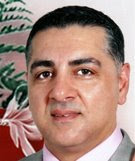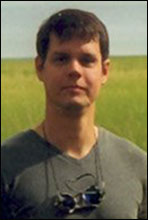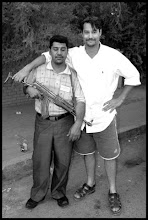This is a reprint of my original book review first posted at ePluribus Media.
Susie Dow reviews
Curse of the Al Dulaimi Hotel: and other half-truths from Baghdad by Colin Freeman, now the Chief Foreign Correspondent of the Sunday Telegraph. Landing in Baghdad on May 1, 2003 as an independent journalist, Freeman's new novel reveals the story behind getting the story including the hilarious antics of his charmingly insane personal assistant, Mohammed Kadom.
August 22nd at 5.01pm. 'Colin, hello, I am Mohammed. When are you coming back?'
August 29th at 2.45pm. 'Colin, hello, I am Mohammed. Man, I have no money and needing the job most desperately. Please ring Jean-Phillipe speedily.'
September 5th at 5.25pm. 'OK, COLIN, FUCK YOU! YOU ARE MY FRIEND BUT YOU DON'T EVEN RING BACK TO ME. FUCK YOU! I WILL FIND THE NEW JOB BY MYSELVES.'
I wish I could figure out a clever way to convey to you how much fun it was to read
The Curse of Al Dulaimi Hotel. I realize that's not a politically correct introduction - after all it's a non-fiction book set in Baghdad circa 2003 through 2005, people are fighting and dying and there's more than one war going on. That's not funny. But I'd be lying if I didn't just come right out and tell you the book is filled with hilarious anecdotes, many so much stranger than fiction, that they must be true and therefore are even funnier as a result. While the humor doesn't qualify as gallows, it is dark. And there were times I definitely felt like I'd accidentally stumbled into the wrong bar at the wrong moment.
'When I drove to the hotel today I saw this beautiful chick, with the huge tits and the ass,' he announced one morning, as I sat with two other foreign journalists. 'I got very erect!'
I stared at him, aghast. Had he really just said what I thought he'd said?
'Er, what do you mean, Mohammed?'
'Erect! You know. Like this!' He pointed to his groin area. The assembled company probably thought Mohammed and I regularly compared erections together.
'Er, Mohammed, I don't think that's really the right word. If a girl, er, makes you feel sexy, you say she turns you on. As in, to turn on a generator.'
'Ok, good. So, anyways, this chick turns me on like a generator...'
Author Colin Freeman holds the honor of being the last Western war correspondent to enter Iraq. His career as a war correspondent, however, was extremely short lived. Just hours after Freeman crossed the border, President George W. Bush announced the end of major hostilities.
Having ditched a steady job writing about road works at the London Evening Standard for the glamor of working in war torn Baghdad, Freeman spends the next two years writing about...roads. Stuck on roads. Driving on roads. Lost on roads. Intended or not, roads are a central theme through out the book. (Well, that and the bad whiskey.) No city today is complete without its noise and traffic. But add some desert heat, grime, guns, bad tempers, looters in stolen buses, car bombs, road side bombs, Humvees, more guns, kidnappers and journalists and it's Baghdad. A city in a country suddenly trying to find its way on its own after thirty years of being told what to do.
We plunged down the wrong way onto a dual carriageway, the cab swerving in and out of oncoming players like a rugby scrum-half heading for the tryline.
'Tell me Haider, why is it that people drive the wrong way down the road here?'
'These Iraqi drivers,' he said as if no further explanation was necessary.
'Yes, but why? Isn't it dangerous, yes?' I pointed at the cars hurtling past us on either side and grimaced and whistled.
Conversation with Haider, I realised, was going to be like playing charades. With a bit of gesturing, persistence and intelligent guesswork, the two of us could sometimes reach a breakthrough.
'Ah, we call this driving "wrong side." Same as in English. Is from Saddam time. The cars of all the big government people would drive down the wrong side, making common people get out of the way. Now everybody is free, so they want to try this themselves.'
I first became aware of Colin Freeman's work on the evening of November 9, 2003 while researching Iraq reconstruction contracts. There was an article in the UK Telegraph about a missing American contractor by the name of Kirk von Ackermann who worked for Ultra Services out of Istanbul, Turkey. The company provided logistics to the US Army. Von Ackermann disappeared the month before, his vehicle found abandoned on a road between Tikrit and Kirkuk. Colin Freeman broke the story. His primary source at the time was another Ultra Services employee, Ryan Manelick. Two months later, Manelick was killed in a drive by shooting just after leaving a meeting at a base near Balad. Shortly before he was killed, Manelick had alleged von Ackermann's disappearance was connected to fraud and that it involved US Army officers. Colin Freeman broke that story as well.
Ultra Services weaves in and out of
The Curse of al Dulaimi Hotel, appearing as early as page 26 with the introduction of one of the company principals, John Dawkins. Freeman shared his first ride into Iraq with Dawkins and another colleague, Omar. Freeman also spent his first night at the same hotel in Baghdad as Dawkins, the Al Majalis, eventually settling in as a regular.
Before I give the wrong impression that
The Curse of al Dulaimi Hotel is all about Ultra Services or kidnappings and murders - which in part it is because it's also about Iraq - let me more properly introduce you to one of the stars of the book, former Staff Colonel Mohammed Kadom. The Colonel is Colin Freeman's first 'fixer' in Baghdad.
To get around, an English speaking journalist needs someone to handle logistics, translation, security, some driving and a little bit of haggling - in short, a 'fixer.' A former Iraqi officer and Ba'ath party member, the Colonel looked like Burt Reynolds circa 1980 and liked to listen to the Bee Gees.
What made it all infinitely more bearable was having Mohammed around. I was now the envy of other journalists. Very few had a translator who was simultaneously fluent, hardworking, streetwise and good company. Occasionally other reporters even tried to poach him off with offers of better money. Touchingly, he always told them his first loyalty was to Mr. Colin, the man who'd first given him a job when he'd been cruising the streets as a cabbie. Actually, it turned out he hadn't really been doing that. Over a beer one night he confessed that he'd actually been selling guns at the time. The day he picked me up, he'd had a stash of Kalashnikovs in the back of the Nissan.
In need of the promise of a steady paycheck, the Colonel eventually went to work for Ryan Manelick, also securing jobs at the company for his brothers.
I don't want to give too much away or it will ruin the joy of discovery. Suffice it to say, there's some thing for every one in
The Curse of al Dulaimi Hotel. News junkies will get high from the constant buzz of deja vu as people, places, and events pop off the pages. The deja vu is in itself a strange sensation: an undercurrent of invisible context that readers 50 years from now just won't be able to fully appreciate. Car bombings - you saw the images on the news played over and over again - Freeman heard and sometimes felt the blast. The Palestine Hotel. Fallujah. Basra. Tikrit. James Brandon. Georges Malbrunot and Jill Caroll - both neighbors in the same hotel. (Carroll plays darts.)
For the armchair traveler, an upfront and personal introduction to hotel rooms, a brothel or two, and bathroom facilities you'll never ever have to confront in person. Just the description of some of the rooms made me itchy. There's not too much about food. Freeman spares us the tell tale signs of gas pains before the arrival of diarrhea (Thank you, Colin) but only just barely. For the armchair adventurer, there's no shortage of danger, complete with a detailed description of what it feels like to be shot in the arse.
My only complaint, if I had one, is I wish I could have heard the stories in person over a pint.
The Curse of the Al Dulaimi Hotel: and other half-truths from Baghdad
By Colin Freeman
Monday Books, July 2008
ISBN-10: 1906308020
ISBN-13: 978-1906308025
272 pages
Colin Freeman is now the Chief Foreign Correspondent for the
Sunday Telegraph in London.







